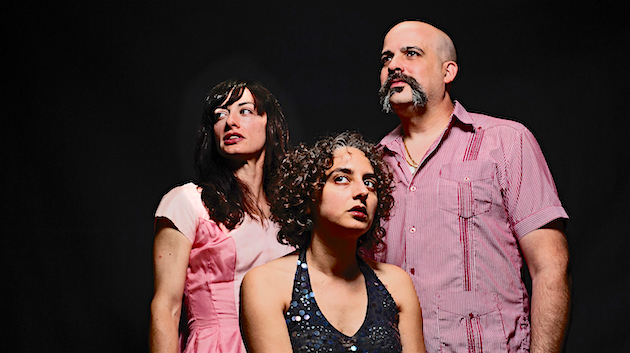
Miramar’s concert in the Bing Concert Hall Studio last night highlighted Puerto Rican boleros of the 1950s. The trio, keyboardist Marlysse Simons Argandoña, and vocalists Laura Ann Singh and Rei Alvarez, has previously worked with compositions from Puerto Rican composer Sylvia Rexach, transforming her mid-twentieth century compositions for their ensemble and taking inspiration from Rexach and other bolero composers to craft their own compositions.
Rexach’s biggest hits, like “Di Corozón,” “Matiz de Amor,” and “Alma Adentro” are still alive today in recordings she made with guitarist Tuti Umpierre in 1958, just three years before her death at age 39. These recordings reveal Rexach as a gripping musical storyteller: the poetry of her lyrics united with the dramatic upper register of her voice, the warm melancholy of her alto range, her subtle rubato throughout phrases, and beautiful slowing for phrases with special narrative import. In these historic recordings, Umpierre plays with stunning delicacy; he seems so sensitive to Rexach’s harmonic language and performance tendencies that a listener could imagine Rexach herself both singing and playing.
Part of the magic in these recordings arises from this extreme responsiveness musicians can have with each other when there are just two performers. Without worries about coordinating larger forces, without preplanning each tempo shift for an entire ensemble, the duo can have a conversation. Each partner is so thoughtful and well-read on the topic to be discussed that they can engage earnestly, from the heart to the heart. Having fewer performers enables a sort of immediacy and sincerity that can be much more difficult with larger musical forces.
To return to Miramar’s concert, it was the duos, the pieces for a single vocalist, that were most effective. When Singh performed “The Forgotten Petals,” she took on a different vocal timbre than the rest of the evening, and took time as she spun her lines with keyboardist Argandoña. Similarly, Alvarez’s performance of Felipe Rodríguez’s “Insaciable” brought out his musical best as he came alive with energy and groove. The group also presented their own compositions and conveyed the stories behind their creation (including a reference to Alvarez and Argandoña’s 8-month old child). In addition to their own works and the compositions by Rexach, they also presented the audience with 1950s boleros from across Latin America.
 Aside from the single-vocalist pieces I mentioned, the performances were low in energy, without the soulfulness of Rexach’s vocal delivery. The ensemble seemed to be working in a beat-driven lockstep that prevented phrase sculpting and time taking. Duo vocal lines shared between Singh and Alvarez, while perfectly articulated linguistically, were noncommittal musically. Perhaps the group is more comfortable in the recording studio, or it’s the end of a long tour, or maybe they had not yet gelled with some ensemble members who were brought on just for these West Coast shows. Whatever the reasons, the energy of their recorded work is very different from what I heard last night. Their eponymous album offers their take on Sylvia Rexach’s pieces, combining verve and intriguing timbre choices with Rexach’s originals — making it a pleasure for Rexach fans without resorting to mere replication of her compositions.
Aside from the single-vocalist pieces I mentioned, the performances were low in energy, without the soulfulness of Rexach’s vocal delivery. The ensemble seemed to be working in a beat-driven lockstep that prevented phrase sculpting and time taking. Duo vocal lines shared between Singh and Alvarez, while perfectly articulated linguistically, were noncommittal musically. Perhaps the group is more comfortable in the recording studio, or it’s the end of a long tour, or maybe they had not yet gelled with some ensemble members who were brought on just for these West Coast shows. Whatever the reasons, the energy of their recorded work is very different from what I heard last night. Their eponymous album offers their take on Sylvia Rexach’s pieces, combining verve and intriguing timbre choices with Rexach’s originals — making it a pleasure for Rexach fans without resorting to mere replication of her compositions.
Over the course of their hour-and-20-minute concert, Miramar gave the audience 15 pieces, many by composers likely new to the audience. This exposure is a gift in itself. Check out Miramar’s recordings: They’ve done something great. And check out the compositions that inspire them. There are deep, rewarding waters there.




